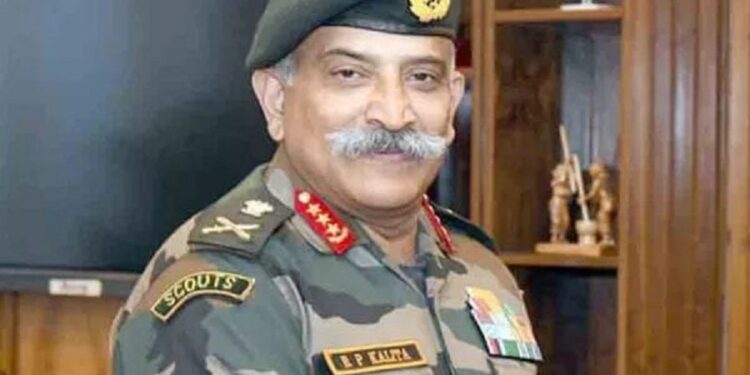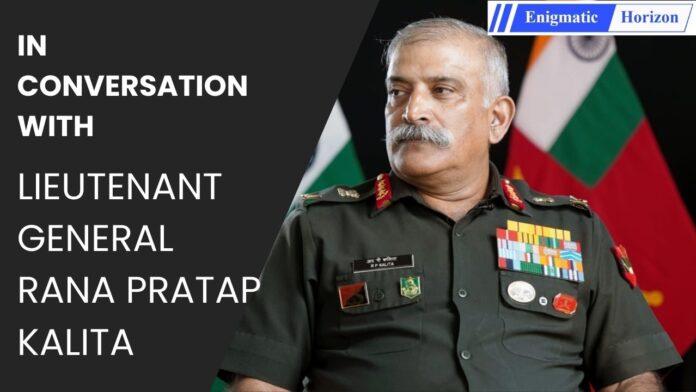Written and edited by – Robin Bhuyan (Editor-in-Chief)
Interviewed by – Raisa Sheikh
Lt. General Rana Pratap Kalita is a former general officer in the Indian Army. After serving the armed forces for about 40 years, he took his retirement at the end of December 2023. He had served as the General Officer Commanding-in-Chief of the Army’s Eastern Command, making him the first person from Assam to hold this charge.
Throughout his career in the Indian army, Lt. General Kalita has received several military honors such as the Operation Vijay Medal, Operation Parakram Medal, Uttam Yudh Seva Medal, Param Vishisht Seva Medal and Ati Vishisht Seva Medal. Let us have a chat with the former general to know about his experiences and some of his insights regarding the military, national security, cybersecurity, etc.
Let’s start by looking back at your tenure as the Eastern Command Chief. What are you most proud of achieving during your tenure?
Because of the diversity and geography, as well as the challenging terrain conditions in the Eastern Command, I consider it one of the most challenging Commands. Additionally, managing the China border and internal situations within the North Eastern states posed further difficulties. During the last two years of my tenure, particularly in 2022 and 2023, we successfully maintained a stable line of control with China without escalation of violence. We effectively addressed differences that arose by adhering to laid-down rules and provisions. Moreover, we maintained peace through proactive measures, collaborating closely with state governments and the police. Notably, we handled the Manipur situation post-May 3rd, 2023, effectively. We achieved complete civil-military fusion in addressing various issues and significantly pushed towards infrastructure development and capacity building.
The Eastern Command approaches several challenges such as border disputes and insurgencies. How did you address these problems during your tenure?
Understanding the challenges faced in the Eastern region is crucial. Being from Assam, I have a deep understanding of the history and geography of the Northeastern states, which aided in comprehending the complexities. Drawing from my previous experience in the North East, I adopted a proactive approach to tackle various issues, including border disputes with China and internal issues created by insurgencies.

Talking about the North East, do you think some people have a wrong perception about joining the Army? What is your opinion about this?
I wouldn’t say their perception is wrong, but rather there’s a lack of awareness about the career opportunities offered by the armed forces. Many are unaware of the diverse career paths available, which I learnt during my tenure here, when I had visited villages and remote areas. In regions like the Northeast, where insurgencies have impacted civilian-military relations, there’s a need to bridge the gap through awareness initiatives. We conducted numerous awareness drives during my tenure to dispel misconceptions and highlight the rewarding aspects of a career in the armed forces.
The Indian Army is undergoing modernization and transformation. What is your opinion on the importance of these initiatives and how can they be further strengthened?
Given the rapid changes in warfare methods due to technological advancements as well as modernization, it is important to make sure that we don’t get left behind! The Indian Armed Forces are undergoing significant transformation not only in HR but also in procurement of weapons, equipment etc. and technology adoption. We need to evolve with time, so that we can keep pace with the changes happening around us.
Cybersecurity is becoming a concern today around the world. How did you prepare the Eastern Command to face such threats?
If we look around in the past couple of years, this has become a major threat not just for the military, but in all areas. We have seen the possible impact of cyber threat which has manifested in our country itself. We initiated awareness campaigns on cyber warfare and implemented defensive measures such as system hardening and network segmentation to bolster cybersecurity within the Eastern Command. Thereafter, we have gone about identifying what defensive measures we need to take, like hardening of our systems, and separating our own networks and such.
India has a growing relationship with other countries in the Indo-Pacific region. How can the Army contribute to regional security and stability?
The Indian Armed Forces have fostered strong ties with neighboring countries such as Bhutan, Myanmar and Bangladesh, through joint exercises and cooperation in countering various challenges, including insurgencies and disaster relief operations. Such collaborations contribute to regional security and stability, promoting inclusive growth and cooperation among nations.
We would like to know about your opinion regarding removal of Article 370?
I think we can see a lot of positive changes after Article 370 was removed, as far as the internal situation in Jammu and Kashmir was concerned. There has been a lot of developmental activities taking place and some of the hindrances that were there due to Article 370 has been takencare of now. And these kinds of positive development are the need of the hour.
What is your advice for youths aspiring for a career in the Indian army? What are the qualities that are needed?
The only advice I have been giving to children or young people is that the first thing for them is making up their minds and working hard thereafter! As far as joining armed forces in concerned, I have always had the thought that it is one of the best professions that one can choose, because we say that army is not a profession but a way of life! It offers you the chance to give to your nation, and the opportunity to protect your nation! It also offers lots of opportunities for leading an adventurous life, and it is a well-settled job, that also lets you see around the nation and the world. This job also allows you to contribute towards nation building. As far as qualities are concerned, there are basic qualities like honesty and integrity. Decisiveness, I feel, is also another key quality of leadership needed in the army. Being compassionate is also important, while dealing with circumstances, it is also important to be analytical and logical. There is a lot of such issues that we need to focus on!
How do you feel evolution of AI and robotics will impact the armed forces? Do you think there is a chance that soldiers might get replaced?
It is important to exploit the technological development to facilitate undertaking our tasks. But the question of replacing a human by these kinds of technology is a different thing altogether, and it has proved incorrect in recent happenings such as the Russian-Ukraine war. The human factor cannot be replaced, irrespective of the technological development. But technology can enable us to work in an enabling environment where you can provide much more in a short time.

Looking into the near future, what are the security challenges that India is likely to face?
Challenges can be internal and external, traditional and non-traditional! By external challenges, we talk about border-related conflicts with neighboring countries. But according to most, the possibility of an all-out conflict, whether it is Pakistan or China, is quite low. The gray-zone domain, which is happening now, is likely to continue. That is a challenge we need to overcome. Apart from that, we need to ensure peace and stability in the border areas. The next type of challenge is the instability in our neighboring countries, like Bhutan, Pakistan, and Myanmar. Any instability in an immediate neighboring country is a challenge for our country as well, and it can impact the peace and stability in our country due to a spillover effect. In addition, like cyber warfare, there are other domains of warfare now, such as legal warfare, information warfare, perception management, etc. The conflict is not limited to physical ones. There are also problems such as drug smuggling, gunrunning, etc. that we need to deal with. Insurgency movements are another problem that needs to be addressed. In the last 10-15 years, a lot of work has been done, and many militant groups have come overground and have signed peace agreements, which are being honored by both sides. I think radicalization and communalism are two issues that need to be addressed, as they might impact the country in the future!
What are your thoughts regarding Agniveer?
Agniveer represents a significant transformation in human resource management within the Armed Forces. While it’s still in its early stages, its pros and cons have been debated. It began two years ago, as you know. The first group will complete their mandatory training in a few years, after which retention and exit will take place. We need to give it some time to stabilize, but it is difficult to form an opinion about it since it is in the initial stage. We can come to an opinion only after a few years, after the system stabilizes!
Recently, there was a movie released on Field Marshall Sam Manekshaw. Do you think our army is being accurately portrayed by the movies?
I think the movies which have come about in recent times indeed involve a lot of detailed research by the directors, writers, and producers. Of course, movies require some level of dramatization. But people are making efforts to portray the Army in the correct light. At least, for the movie “Sam Bahadur,” I can say that for sure! They have indeed done a lot of research on the life of Sam Manekshaw, the iconic figure.
What are your hopes for the future of the Indian army?
The Indian army, as it stands, is one of the best armies, needless to say! Since I had the opportunity to operate in the international environment, as a part of the UN’s peacekeeping force twice, I can say that the Indian army has high esteem by the armies around the world. Time and again, the Indian army has delivered what the nation had expected and contributed towards nation-building right from independence.
Thank you for your precious time! It was a pleasure talking to you.
Thank you!
